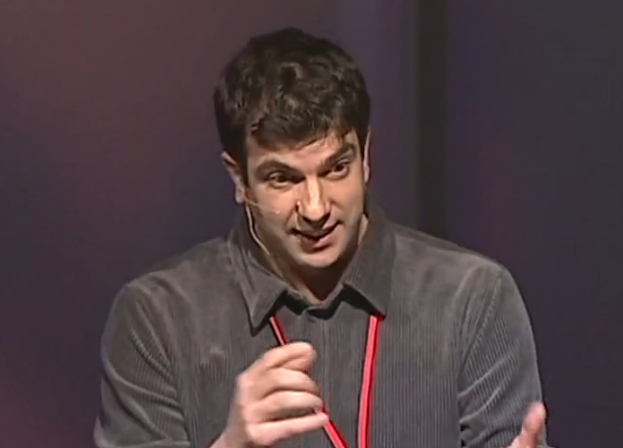So, you know, if you want to become more compassionate,
所以,你知道的,如果你想要变得更有同情心,
you visit sick people in the hospital, and you will become more compassionate.
你去医院探望生病的人,然后你会变得比较慈善。
You donate money to a cause, and you become emotionally involved in that cause.
为某慈善事业捐钱,然后你就放感情在那件事里面,
So, it really was cognitive psychology -- you know, cognitive dissonance -- that I was experiencing.
所以,这是认知心里学--认知的不一致--这是我经历的。
The Bible actually talks about cognitive psychology, very primitive cognitive psychology.
圣经实际上是关于认知心里学,非常基础的认知心里学。
In the Proverbs, it says that if you smile, you will become happier, which, as we know, is actually true.
箴言这样说,如果你微笑,你会变得比较快乐,就像我们知道的一样,这是真的。
The second type of rule that was difficult to obey was the rules that will get you into a little trouble in twenty-first-century America.
第二种非常难去遵循的律法是这些律法会让我们在21世纪的美国遇到小麻烦。
And perhaps the clearest example of this is stoning adulterers.
一个明显的例子是:拿石头打通奸的人。

But it's a big part of the Bible, so I figured I had to address it.
但是,这是圣经的很大一部分,所以我认为我必需提出来。
So, I was able to stone one adulterer.
所以,我真的拿石头打了一个通奸者。
It happened -- I was in the park, and I was dressed in my biblical clothing,
它发生了--我当时在公园而且我穿着我圣经式的装扮
so sandals and sort of a white robe, you know, because again, the outer affects the inner.
凉鞋和白长袍--你知道,因为刚刚所说,外在影响内心。
I wanted to see how dressing biblically affected my mind.
我想了解圣经式的装扮,如何影响我的内心。
And this man came up to me and he said, "Why are you dressed like that?"
然后这个男人过来找我并说,"你为什么要穿成这样?"
And I explained my project, and he said, "Well, I am an adulterer, are you going to stone me?"
然后我解释我的这个计划,然后他说:"喔,我是一个奸夫,你打算拿石头打我吗?"
And I said, "Well, that would be great!"
然后我说:"哇!这很棒喔!"












